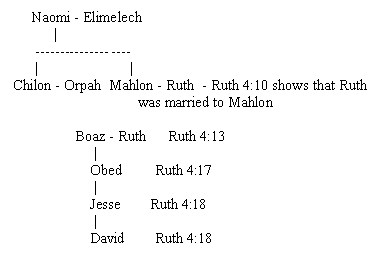|
June
20
|
Reading 1 - Ruth 1 & 2
Peter Cresswell
Peter Cresswell
1
v.4
The mention of ten years is the only time reference in the whole of the
book of Ruth.
That a Moabite was not to enter into the congregation of the Lord till
the tenth generation can be seen. [Deuteronomy
23:3]
The
family

So how was David allowed to be king as he was only the fourth generation?
2 v.2 Whilst the A V has 'ears of corn' the Hebrews actually just has 'ears' so what they were gathering is not specified though we know that it was barley as it was the time of the barley harvest. [Ruth 2:17] That Ruth was gleaning despite the fact that Naomi came from an important family in Bethlehem demonstrates why Naomi said that she was to be called bitter - she was destitute, and a widow at that. However we know that Yahweh cares for the '... widow' [Deuteronomy 10:18 Psalm 68:5 146:9 Proverbs 15:25]
2 v.9 Boaz was a faithful man who, we presume, would endeavour to employ faithful men. However he feels the need to give his young men charge that the do not harm Ruth. An indication of the Godlessness in Israel at this time during the Judges.
2
v.14 That they
ate 'parched corn' is interesting. It is a phrase which is never used
after the time of David. [Leviticus
23:14 Joshua 5:11 Ruth 2:14 1 Samuel 17:17 25:18 2 Samuel 17:28] Implying
that the author of the book of Ruth was aware of the specific customs
of the time. Just a little point which helps in building up an armoury
or data which shows the authenticity of the Bible. We should be looking
at the fine details of the accounts in Scripture and thinking about the
language.
Peter
Forbes
ch 1 - The book of Ruth typifies the call of the gentiles - the taking of a gentile bride by a faithful man of Judah. So we should not be surprised to see the links
|
My
people
|
Isaiah
40:1
|
|
|
Thy
God
|
Isaiah
40:1
|
ch 2 - Another link with Isaiah 40
|
Comfort
|
Isaiah
40:1
|
Bethlehem
1:1,
2, 20, 22
2:4
4:11
2:12
The 'full reward' is what we are hoping for (2
John 8), John is quoting the words of Boaz to Ruth.
Peter
Forbes
How do you get on with your in-laws? There never seems to be a shortage of mother-in-law jokes and stories - but here is a mother-in-law to be proud of. Naomi.
Naomi, Elimilech and their two sons went to live in Moab. Elimelech died, her sons got married and then her sons died. What better excuse to get rid of your mother-in-law than to have your husband die and not to be left with the ties any more. But Naomi's two daughter-in-law's, Ruth and Orpah had no intention of leaving Naomi. They loved her. That tells us that Naomi was an absolutely amazing person. Ruth in particular loved her more than her own parents and country. She loved her so much that she gave up everything she ever had or could have for her love of Naomi. She said, "Where you go I will go, and where you stay I will stay. Your people will be my people, and your God my God … may the LORD deal with me, be it ever so severely, if anything but death separates you and me."
Wouldn't you love to be like Naomi? There are plenty of places in the Bible that tell us how to love each other. Read them. Learn them. Live them. Then you will be loved like Naomi.
Robert Prins
"Just them Boaz arrived from Bethlehem and greeted the harvesters, 'The Lord be with you!'
'The LORD bless you!' they called back."
What a positive start to the day!
I heard a saying the other day, "Sometimes I wake up grumpy in the morning - and other times I let her sleep"! However, if we had a positive start like Boaz there would be much less grumpiness.
What are our morning greetings like? They can range from a grunted "Uhh," through to the blessing that Boaz gave.
One of the most common morning greetings is "Good Morning" We often say "Good Morning" to nearly everyone we meet. Why is it a good morning? It is good because we have a new day to serve God, a new opportunity to accept his salvation and we are surrounded by his love. So when we say, Good Morning," to someone today, be sure to give them the "Good" and let them know what God has done and prepared for them. Let us in our greetings prepare for the greeting of Jesus in the kingdom. "Well done good and faithful servant, enter into the joy of your Lord."
Robert Prins
Reading 2 - Isaiah 44
Peter Cresswell
Peter Cresswell
Peter Forbes
Peter Forbes
Peter Forbes
Reading 3 - Jude
Peter Cresswell
v.5 The Exodus
v.6 Korah Dathan and Abiram
v.7 Sodom and Gomorrah
v.9 The returning captives [Zechariah 3:2]
v.11 Cain
v.11 Baalam
v.11 Korah [again]
to reinforce his assertion that the problems that were being experienced were not new.
The warning from these individuals and events appealed to is that such practices bring death. Even those who were 'saved out of Egypt perished.The warning is clear for us.
Peter Forbes
Jude is writing to combat errors that have already crept into the ecclesias. Nortice the way in which he speaks of things in the past tense
| :3 | was once |
| :4 | are crept in |
| :11 | have gone |
| ran | |
| :12 | are |
| they are | |
| :15 | are |
| have | |
| have |
Peter Forbes